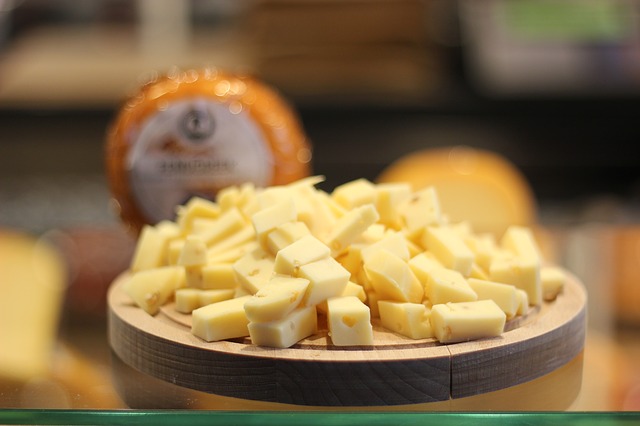Cheese is a favorite of a lot of humans. We love it and many of us keep it in our refrigerators almost all the time. We also love our dogs and like making them happy by sharing whatever we enjoy with them. We care about our dogs enough to know that we are responsible for keeping them safe, too. We humans can read labels and learn about food items to make educated choices while our dogs trust us enough to snatch up anything we offer them. This trust can put them in harm’s way if we do not know what is safe to share. Cheese lovers may wonder… Is it safe to share our cheese?

Cheese is a dairy product made from milk, usually cow’s milk (sometimes sheep or goat). It has a variety of textures and flavors from the coagulation of milk proteins and the amount of fat in the milk. According to the International Dairy Foods Association, legend says that cheese was invented 4,000 years ago by an Arabian merchant who traveled the desert with milk stored in a sheep’s stomach pouch. Supposedly the rennet (an enzyme used to make cheese) from the sheep stomach caused the milk to separate into whey and the curd. The merchant was hungry and thirsty, so he sampled the curd (cheese) finding it tasty and filling. The rest seems to be history.
Since dairy products come from milk, which is naturally designed for juvenile herbivores, they are not ideal as the staple of canine diets. Some dogs (like some people) are truly lactose intolerant and should avoid dairy products completely. Affected dogs can develop issues when they eat cheese, characterized by gas and GI distress. Normal dogs can even have some trouble digesting milk proteins just because they have evolved to be for the baby calf or goat’s system exclusively.

Be absolutely sure that the cheese you share is 100% cheese with no additives. Some processed cheese has added spices, like onions and garlic, which should be off limits for dogs. Some cheese rolls are rolled in chives, which are another member of the Allium family (onions, garlic, chives, scallions, shallot and leek) and should be strictly avoided for dogs.
For dogs that can tolerate being given cheese, it should always be given in moderation. Small shreds of cheese can make great rewards for training, but never more than tiny amounts. Just remember, your dog is probably grateful for even a little taste since she cannot really comprehend quantity and measures. Cheese does contain varying levels of fat and lactose which can make dogs sick, so make sure you practice moderation, no matter how skillfully your dog begs!
Do you want to know more about dogs and other animals? Follow me on Facebook by clicking here.
